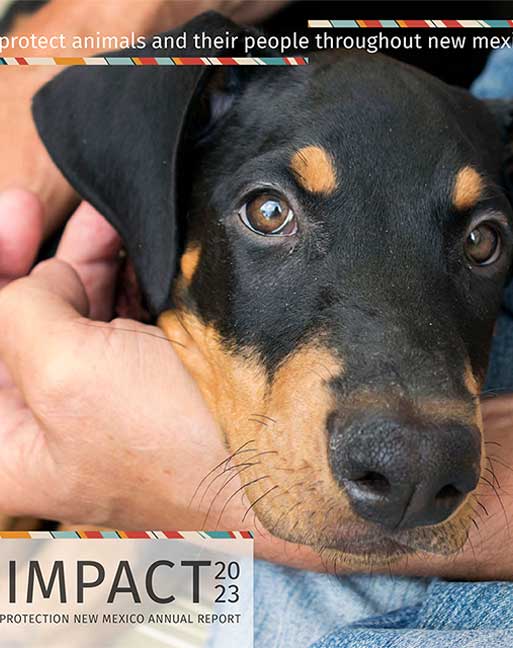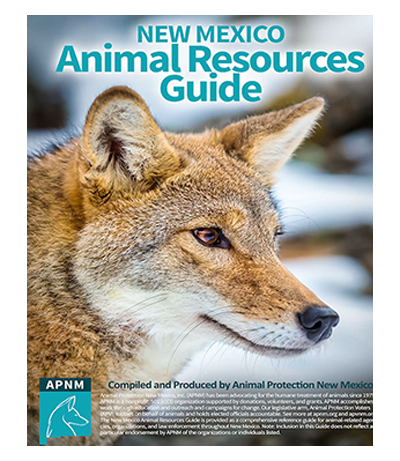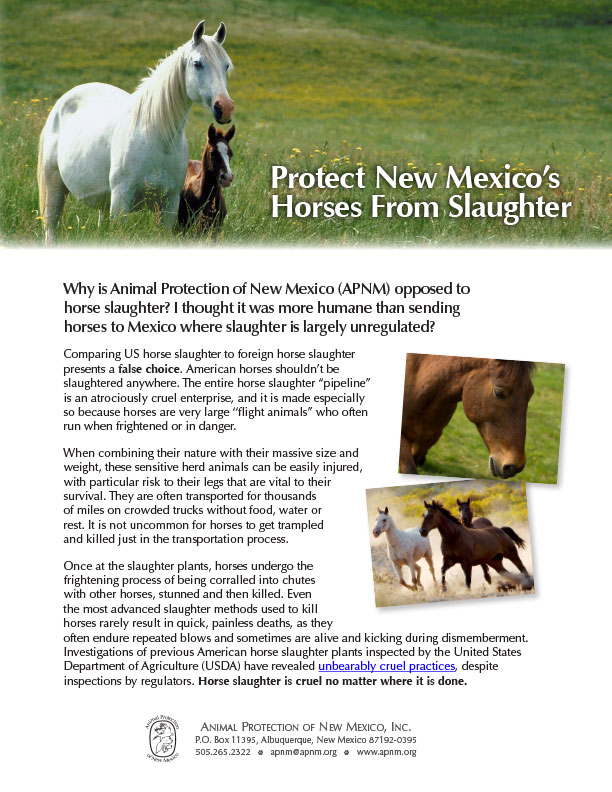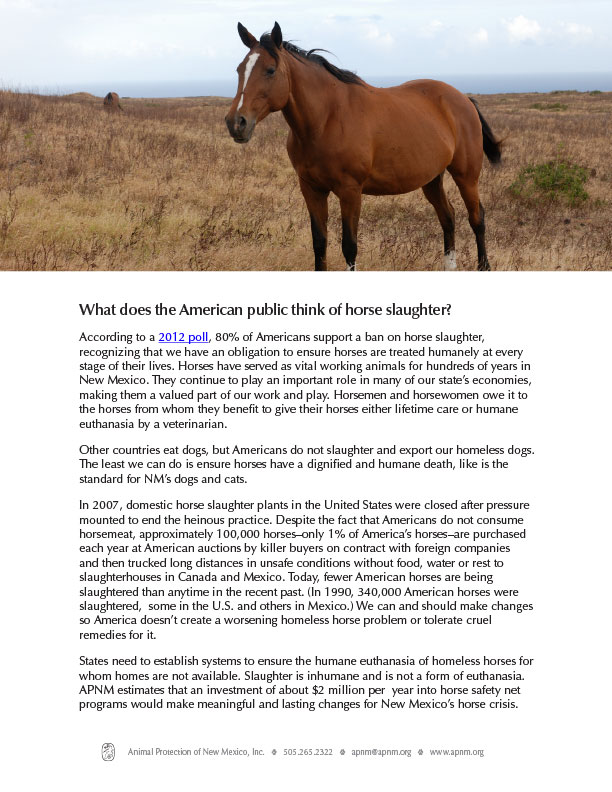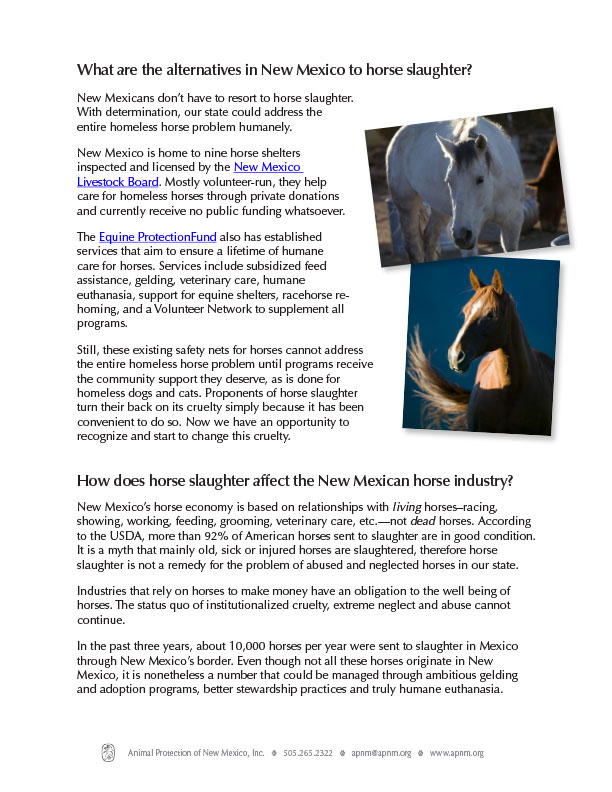According to a 2013 scientific poll, New Mexicans are overwhelmingly opposed to the cruel, needless practice of equine slaughter and are opposed to the opening of any facility doing so in our state. We maintain that horses, donkeys, and mules are valuable to our lives, are an important part of our cultural heritage, and they deserve humane treatment throughout their entire lives. We reject any attempts to reduce these animals to mere commodities.
Since 2010, Animal Protection New Mexico has been leading efforts in New Mexico to interrupt the horse slaughter pipeline and create a truly humane equine safety net.
In 2016, a New Mexico District Court issued a Stipulated Final Order barring Valley Meat from slaughtering horses for human consumption in New Mexico, and from manufacturing, selling, or distributing horsemeat products for human consumption in New Mexico.
The Facts About Horse Slaughter
Who opposes horse slaughter?
A 2012 poll found that 80% of Americans do not want horse slaughter to occur anywhere. And a 2013 poll showed that 70% of New Mexicans, including 75% of Latino respondents, do not support horse slaughter. Many prominent New Mexico officials have publicly voiced opposition to horse slaughter, including U.S. Senators Tom Udall and Martin Heinrich, U.S. Representatives Michelle Lujan Grisham and Ben Ray Luján, Governor Susana Martinez, Attorneys General Gary King and Hector Balderas, and State Land Commissioner Ray Powell.
Isn’t it better to slaughter horses in the U.S. where the slaughterhouses will be regulated by the federal government?
Industrialized horse slaughter is not and never can be humane, no matter where it is practiced. As large “flight” animals, the physical and psychological nature of horses means that they suffer horrifically at every step of the process. Horses panic and trample one another while being loaded onto trucks and then suffer from dehydration, starvation, and exposure during transport. At the slaughterhouse, the weakened horses are forced into chutes and then subjected to ineffective mechanical killing devices. Video documentation shows that, frequently, slaughtered horses are not killed cleanly and are subjected to multiple hits by the bolt gun or similar device and are sometimes still alive when butchering begins. Humane euthanasia by a veterinarian is the method that should be employed when horses can no longer be given proper care.
We already slaughter many types of animals for human consumption. Why should horses be different?
Horses are different. New Mexicans and Americans have worked side by side with horses, donkeys, and mules in the creation of our society. Horses have helped us in transportation, mail communication, agriculture, companionship, athletics, and even war. Most Americans view horses differently than other animals classified as “livestock”.
Isn’t death by slaughter quicker and more humane than allowing a horse to starve?
Slaughter is not and cannot be a solution to suffering, as it is inherently cruel. The only way to prevent suffering of horses is to support and build upon existing “safety net” programs like the Equine Protection Fund, which ensures feed, gelding, veterinary care, adoption for needy horses, and humane euthanasia when homes are not available.
What about the jobs that a slaughterhouse could bring to our state?
Living horses and the many ways they are incorporated into our lives represent a much greater benefit to New Mexico than dead horses.
If people want to eat horses, isn’t that a viable solution to horse overpopulation?
“Horse overpopulation” is the result of uncontrolled breeding and the lack of an adequate safety net to help horses and families in hard times. Horses are routinely given drugs, making them unfit for human consumption. In June 2013, NM Attorney General Gary King issued an Opinion that horse meat fits the legal definition of adulterated food and cannot be manufactured, sold, or delivered anywhere in New Mexico, regardless of where the food is ultimately sold or consumed.
Additionally, Americans have never had a taste for horsemeat – our relationship with the animals goes much deeper than that – and the domestic market for the meat is nonexistent. Further, relying on the fickle tastes of foreign countries is not a serious solution to the needs of neglected horses. Horsemeat consumption is declining worldwide. European countries are now seriously questioning their own consumption of American horsemeat because of carcinogenic residues from veterinary medications used widely in the U.S. If the European Union institutes a blockade on horses without complete veterinary histories, as they have threatened to do, this will leave almost all U.S. horses unsuitable for foreign markets. Asian countries have never significantly imported American horsemeat. There is no way to slaughter our way to a solution.
News & Media
New Mexico Succeeds in Legal Fight to Bar Horse Slaughter (Albuquerque Journal, Feb. 5, 2016)
Crucial Committee Vote Backs Defunding of Horse Slaughter (Horsetalk, 5/30/14)
Navajo Leader Drops His Support of Slaughter… (New York Times, 10/7/13)
Judge Grants Temporary Restraining Order Against Horse Slaughter Plants (Public News Service, 8/5/13)
N.M. at Center of Horse Slaughter Controversy (Albuquerque Journal, 8/2/13)
Navajo Nation Will Support NM Horse Processing Plant (Capitol Report New Mexico, 7/31/13)
Vote a Victory for Slaughterhouse Foes (Albuquerque Journal, 6/14/13)
Plant Faces New Hurdle on Horse Meat (New York Times, 6/10/13)
There’s No Place for Horse Slaughter in Our State (Albuquerque Journal, 5/9/13)
Slaughterhorse-Five (Santa Fe Reporter, 5/1/13)
Horse Slaughter Plant Closer to Approval (Associated Press, 4/24/13)
Obama Moves to Block Horse Slaughter (New York Times, 4/11/13)
Rep. Ben Ray Lujan’s Letter Agriculture Secretary Tom Vilsack (Office of Rep. Ben Ray Lujan, 4/10/13)
New Research Reveals New Mexicans Strongly Oppose Slaughter of Horses for Human Consumption (ASPCA, 4/4/13)
Horse Slaughter Wrong for Our State (Santa Fe New Mexican, 3/23/13)
What You Can Do
- Contact your member of Congress and ask her/him to support the Safeguard American Food Exports (SAFE) Act of 2017, R. 113.
- Gather support for humane treatment of horses. Do you know of a community gathering, church meeting, family event, or other social activity where compassionate people gather? Bring APNM’s fact sheet on slaughter and encourage people to send an email on the subject to their member of Congress. Well-written, personal emails are noticed and will make a difference for the horses. Contact us for help.
- Support healthy, thriving horses. Volunteer at one of New Mexico’s equine shelters.
APNM’s Horse Slaughter Fact Sheet
click for PDF


